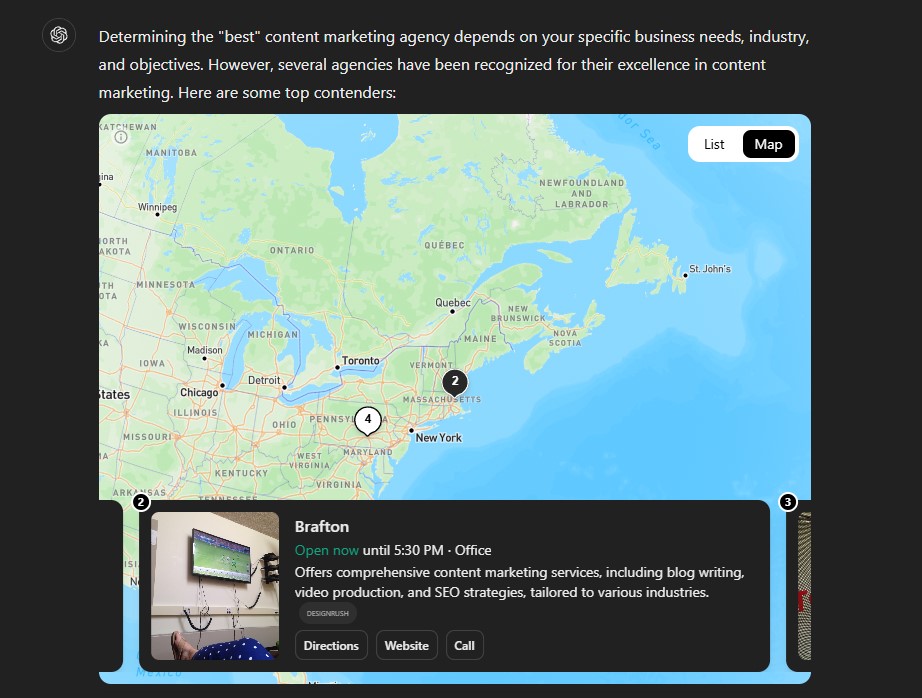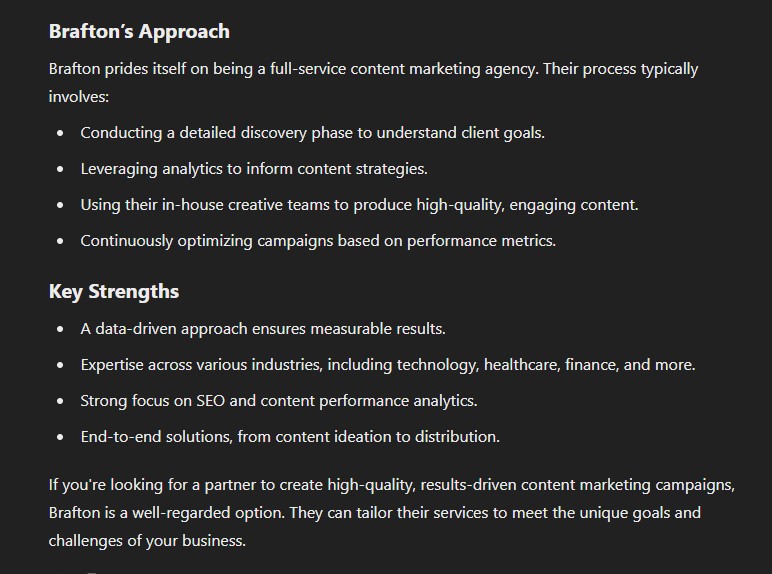Of course businesses wonder and care about what consumers think of their brand — but what about the algorithm? And I’m not talking about Google; no, another algorithm entirely. I’m talking about ChatGPT.
For as long as people have been online, brands have labored to polish their image on the web. With ChatGPT and other generative AI tools upending the game, it’s increasingly important to consider how these machine learning algorithms talk about your brand.
What are they saying about you and why? Is this a good thing? What can you do about it?
I want to explore the (kind of strange) world of ChatGPT and how to use Gen AI as a proxy to understand how your brand comes across on the internet.
Find Out What the Algorithm Thinks About Your Business
OK, so I’m going to give you some homework. Actually, let’s call it a fun activity.
Start by asking ChatGPT what or who the best X is in your industry. For Brafton, here’s what I entered:
“Which content marketing agency is the best?”
And here’s what I got:

We were listed second in this new interactive map feature via ChatGPT search. Whether your business does or not, continue the activity by asking it to tell you about your business in more depth, like this:

Not too shabby! I’d say that’s a pretty accurate snapshot of our agency. Because of my question, the algo goes on to list what we do in decent depth, starting with content creation through to marketing strategy and consulting and everything in between. It even lists “Brafton’s Approach” to content marketing and what it believes to be our key strengths:

Still pretty good!
But enough about us. I think it’s not only fun to ask tools like ChatGPT about your business and brand, but also a valuable activity for marketers to explore. Think about it: These tools are trained on all kinds of data from across the internet, distilling copious amounts of information down into a more pointed paragraph or two.
Even with Gen AI tools embedding search features that can crawl just a few websites in real-time, conceptually, shouldn’t that mean that whatever ChatGPT spits out is a fair representation of how your brand is portrayed on the internet? Even with search, it still has to digest the content on your website, so I think that’s a fair statement.
But why does it matter?
Asking ChatGPT About Your Business Can Be a Useful Proxy
ChatGPT reflects patterns, language and information that are commonly found in publicly available sources up to its knowledge cutoff (or based on real-time web access if using the search feature). This means it can retrieve and deliver information including:
- General perceptions of your business.
- Public reviews, summaries or insights.
- How your business is described in articles, social media and other digital content.
By asking about your business, you can get a high-level summary of the type of information available about your brand online and how it’s framed.
But more than that, you can also ask it directly about certain aspects of your messaging, such as:
- Whether your key branding messages are clearly conveyed.
- If there’s confusion or mixed information about your business.
- How well your business identity is recognized compared to competitors.
When I asked: “How does Brafton’s brand identity compare to its competitors?” I got a surprisingly comprehensive answer that’s too long to share here. But here’s a little snippet I thought was interesting, where it highlighted out “Distinctive Attributes”:

As you can see, the hyperlink at the bottom (that little Brafton bubble) means it gleaned some or all of that information from our website. I’d say that these points are fairly accurate, but what if you ask ChatGPT a similar question about your business, but you aren’t happy with the answer?
Working To Improve How You Appear In Gen AI Tools
Optimizing for Gen AI is a new concept (of course) but marketers are already starting to consider it. In fact, when ChatGPT and similar tools talk positively about your brand, it can actually win you new business.
Perform a ChatGPT Audit
If you’ve been playing along while reading, you may have already done this. Whether you like your results or thought pieces were missing, get into the habit of regularly asking ChatGPT about your brand. Is what it’s saying accurate? Is there any important information it’s leaving out?
Make it a part of your standard, scheduled site and SEO audits and take notes about how you might need to tweak your content to help Gen AI search serve specific details about your brand.
Allow Search AI Crawling
Before you even begin optimizing for Gen AI, ensure that you configure your website robot.txt file to allow crawlers to see your pages. You’ll find it in the root directory of your website. Here are a few basic commands to know:
- User-agent: Specifies which web crawler the rule applies to (e.g., Googlebot, Bingbot, etc.). Use * to target all crawlers.
- Disallow: Specifies paths or directories you don’t want crawlers to access.
- Allow: Specifies paths or files you want crawlers to access, even within restricted directories.
Once configured how you like, crawlers will be able to see and index the pages you’ve allowed them to, which brings up another important point: be mindful. If you don’t want sensitive brand content or information used to train AI models, you have to restrict access to those pages, otherwise, it’s open season on your website. There’s a delicate balance to achieve here if you want the best of both worlds, so just be sure to take your time when playing around with the robot.txt file, and check and double-check your settings.
Refine Your Online Content
With these Gen AI algorithms slowly encroaching on more traditional search methods, refining content specifically for AI may become increasingly important. That said, it’s difficult to tell right now whether that strategy will ultimately look the same as it does for SEO and ranking on Google or be a completely different type of strategy. Nonetheless, both entail talking about your business on your website and other places, so refining content is never a bad idea.
Explore your landing pages, consider what might be missing and update content accordingly. For example, throughout my lengthy interaction with ChatGPT about Brafton, it didn’t once mention our SaaS Content Marketing Platform, which we’re quite proud of. While I didn’t ask about the platform specifically, it’s a large enough part of Brafton’s business that I kind of just expected it to pick up on it. So, maybe that means we aren’t talking about it enough and we need to jump into our landing pages to make some changes.
Off-site content, such as your Google Business Profile and reviews, while they’ve always been important to keep updated, stand to be even more critical now that Gen AI like ChatGPT can directly recommend businesses in users’ areas based on their queries. If it’s been a while since you’ve had a look at your business profile, dive in and make some changes so that when AI serves you up, users receive accurate information about your business.
Search Is Changing
For years, we’ve been assessing Google and all the different ways that, as a business, we can infiltrate SERPs. But with ChatGPT able to search the web now, things are changing. It’s another channel entirely and it plays by a different set of rules.
Of course, the algorithm recommends other agencies too, but that’s neither here nor there, because so does Google. ChatGPT didn’t always have access to real-time information, but its ability to synthesize loads of material into condensed answers means that you can use it to learn a little bit about how your brand could be perceived online — or about what’s missing from your profile — and take steps to improve.
Try it out for yourself! See what ChatGPT knows (or doesn’t know) about your brand. And if it doesn’t give answers you’d write yourself, explore ways in which you can make them better in the future.






